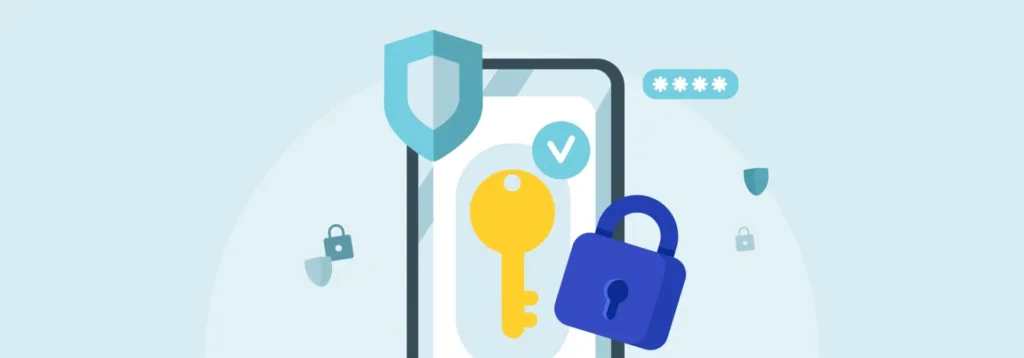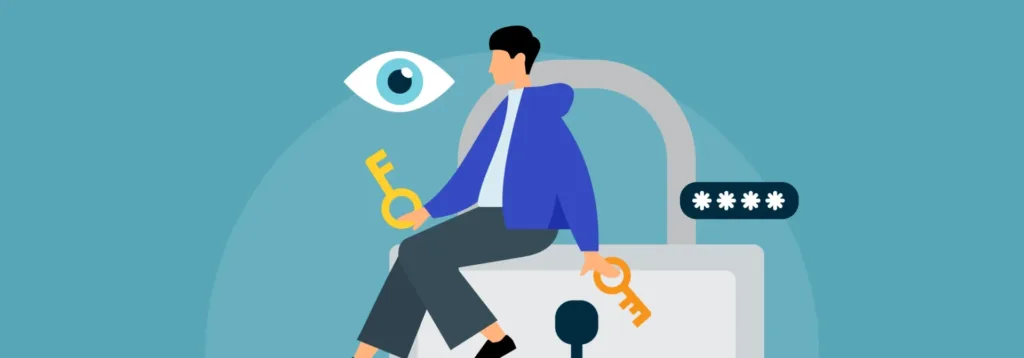BISON General Security Information
General Security Notice for Your BISON Account
Keep Your TAN Private
Your TAN (Transaction Authentication Number) is a crucial security feature. Even if unauthorized persons gain access to your email and password, the TAN protects your account from being compromised. For your safety, never share the TAN you receive on your smartphone with anyone. Always use your own phone number for account-related verifications.
Protect Your Login Credentials
Always store your login credentials (email and password) securely and ensure they are inaccessible to others. Do not share this information with anyone, especially strangers.
BISON Employees Will Never Ask for Your Login Information
Our team will never request your login details or ask for remote screen access using tools like AnyDesk or TeamViewer. If someone contacts you via email or phone requesting your login credentials, be cautious and do not share them under any circumstances.
Recognizing and Avoiding Phishing Scams
Phishing attacks are fraudulent attempts to obtain your personal or sensitive information through emails, chat messages, calls, or fake websites. Attackers often pose as trusted organizations to gain access to your credentials.

Two-Factor Authentication (2FA) for Extra Security
Two-Factor Authentication significantly enhances online security. Even if someone steals your credentials, they won’t be able to access your account without a second verification step, like an SMS code.

Why AML (Anti-Money Laundering) Is Important
At BISON, we believe in building long-term, sustainable customer relationships. That’s why we implement AML-compliant processes to prevent money laundering. These measures also protect our valued customers.

Secure session – Your extra protection for crypto withdrawals

In short – Our security tips for your safety at BISON
What does BISON do for your security, and what can you do to prevent phishing attacks? Follow these key points to protect your BISON account:
- Phishing: Cybercriminals may attempt to steal your credentials via emails, chat messages, phone calls, SMS, fake websites, or social media accounts. Their goal is to gain access to your account and carry out fraudulent transactions.
Protect yourself from password & data theft:
✓ Do not respond to messages from unknown sources.
✓ Ignore requests to enter or share your data.
✓ Never share your password with third parties.
Rest assured: BISON will never ask for your password. - Keep Access to Yourself: Never let third parties access your account. BISON will not ask you to transfer cryptocurrency to participate in giveaways or similar offers.
- Our Team: We do not employ staff who offer or make investment decisions on your behalf, and we will never contact you about such matters, whether by phone or any other means. We will never contact you from unofficial accounts or ask for sensitive data. Report suspicious emails to your provider as spam or phishing and inform us at [email protected].
- Enable 2FA: Our SMS-based Two-Factor Authentication is enabled for new logins on unknown devices, password changes, and cryptocurrency withdrawals. No setup is required, as it is pre-activated for all users. Find more details in our FAQ.
- Use Strong Passwords: Avoid reusing passwords across multiple platforms. Check resources like the Federal Office for Information Security for tips on creating secure passwords.
- Stay Alert to Unusual Behavior: If you notice suspicious activity related to your account, contact our support team at [email protected].
How can I be sure I’m really communicating with BISON?
Unfortunately, some third parties falsely claim to represent BISON, using our logo or similar names without authorization. WARNING! These individuals have no connection to BISON and are likely acting fraudulently. Please keep the following in mind:
We only communicate through our official email channels:
- [email protected]
- [email protected]
- [email protected]
- [email protected]
- [email protected]
- [email protected]
- [email protected]
- [email protected]
These are our official websites:
And our social media accounts:
BISON will never contact you through other channels. Do not share sensitive information (personal data, login credentials, or wallet addresses) with anyone. If you’re contacted from an unofficial email address, do not respond. Report it to your email provider as spam or phishing and notify us at [email protected] if you spot anything suspicious.
Identity Fraud Warning
What is Identity Fraud?
Identity fraud is a type of scam where perpetrators pose as representatives of reputable organizations—such as companies or government agencies—to facilitate other crimes, like investment fraud. They adopt fake identities and claim roles such as clerks, advisors, brokers, analysts, or financial experts, aiming to deceive individuals into handing over their money.
To appear credible, these fraudsters present forged documents such as certificates, passports, or licenses. They also mimic the websites of trusted institutions and contact victims via email or phone under false pretenses.
How to Recognize Identity Fraud?
Fraudsters often establish initial contact with their victims through modern communication channels, such as social networks or messenger chat groups. Sometimes, individuals inadvertently fall into their traps by clicking on fake online ads—often featuring prominent personalities—and providing their contact details. Personal contact frequently occurs via foreign (mobile) phone numbers or WhatsApp calls. Victims are then presented with an investment proposal promising lucrative returns. They are instructed to transfer money to a specified—usually foreign—bank account or even to open accounts with financial service providers to send payments to a designated recipient address.
During the scam, victims gain access to a supposed account on a fake website imitating the fraudster’s claimed organization. The site falsely displays profits. When victims attempt to withdraw these fictitious earnings, the fraudsters demand taxes or other fees to extract additional payments. Communication remains frequent and persuasive as long as the victim continues making payments. However, once the payments stop, the contact is abruptly cut off, leaving the victim with financial losses.
If the victim encounters difficulties making payments, the fraudster offers “assistance.” Using remote access software, they gain control of the victim’s computer, obtaining full access to the device.
In some cases, victims are manipulated into transferring funds that have been fraudulently deposited into their accounts to other accounts. These funds often belong to other victims of the scam.
How to Protect Yourself from Identity Fraud
- Be cautious of unexpected contact from individuals claiming to represent trusted organizations. Verify their identity by directly contacting the organization through official communication channels.
- Be wary of investment offers that seem too good to be true, especially if they come via social media, chat groups, unsolicited emails, or (WhatsApp) calls.
- Do not share personal or financial information until you have thoroughly verified the legitimacy of the request.
- Always use official websites of financial institutions and carefully check the URL to ensure it is not a fraudulent copy.
- Do not allow anyone you do not personally know and trust to access your computer remotely or gain control of your financial accounts.
- Do not make transfers or payments until you are certain the request is legitimate.
- Avoid conducting transfers on behalf of others through unfamiliar accounts.
- Do not open accounts based on the persuasion of third parties.
- If unsure about an investment offer or the legitimacy of a request, seek independent advice from consumer protection organizations.
- Report suspicious contacts and fraud attempts to the relevant authorities and platforms.
What are common practices?
Third parties pretend to be employees of BISON or the Boerse Stuttgart Group on networks such as LinkedIn or Xing:
- An alleged financial analyst contacts you via a network
- You are offered a “lucrative investment” or verification is to be carried out, for example to protect your account or approve a transaction.
Telephone contact by alleged employees of BISON or the Boerse Stuttgart Group:
- You receive a call from an alleged employee of BISON or the Boerse Stuttgart Group.
- The caller asks a lot of open questions and tries to get as much information as possible from you during the conversation.
- You are then offered the opportunity to get in touch via a messenger app.
Contact by email from alleged employees of BISON or the Boerse Stuttgart Group:
- You receive an email from an alleged financial advisor or employee of BISON or the Boerse Stuttgart Group.
- You are asked to click on a link or send a reply to a specific e-mail address.
ATTENTION: Through so-called spoofing (methods to conceal identity), e-mails or calls may appear to come from an official e-mail address of BISON or the Boerse Stuttgart Group, although they were sent by third parties. If you have any concerns, please contact our support team at [email protected].
Common Fraud Schemes on the Rise
Online version of the “shock call”
Online version of the “shock call”
- Criminals combine traditional “shock call” techniques with digital fraud methods.
- They claim that personal data is at risk or that the victim is involved in a crime, apply intense pressure, and demand immediate payments or transfers of funds to supposedly “secure” accounts or wallets.
- Perpetrators often use spoofed caller IDs, chat or email messages, fake support chats, or even AI-mimicked voices to appear especially convincing.
Typical sequence of events:
- Initial contact (phone, email, or messenger): The attackers create a shocking message and put the victim under severe time pressure.
- Real-time instruction: During the call/chat, the victim is guided step-by-step to create a new wallet, which the attacker has already prepared in advance.
- Seed phrase: The victim is given a so-called seed phrase (recovery phrase), a list of words that grants full access to a crypto wallet and its funds.
- Recovery: The victim enters the seed phrase, thereby restoring the attacker’s preconfigured wallet on their device and enabling the attacker to access the funds.
- Transfer: The victim then transfers cryptocurrency to the supposedly “secure” wallet and confirms the transaction, for example, with a digital signature.
- Theft: The perpetrators immediately empty the wallet of all funds, including the victim’s funds, and can no longer be reached afterward.
Romance Scam (Pretending to Be in Love to Gain Financial Support)
- You meet someone online or through social networks.
- At first, the connection seems exceptionally warm and friendly.
- After some time, the person claims they or someone close to them is in financial trouble and urgently needs your support.
- They repeatedly ask for help and use emotional pressure to prompt you into making transactions, despite never having met them in person.
- You are presented with what appears to be a unique opportunity to get closer to an extraordinary person, and you don’t want to miss it.
Fraud Scheme: "False Promises of Profits"
- You are “advised” by someone you don’t know personally.
- They claim you are entitled to large sums of money or winnings.
- You are asked to make an advance payment, pay taxes, provide a security deposit, or similar as proof of identity, verification, or to unlock the funds supposedly owed to you.
- You are repeatedly contacted and urged to make investments and transactions.
- Fake registration documents, certificates, or guarantees are presented as proof of your entitlement. Trusted, established companies, authorities, or official institutions may also be falsely cited as involved, though you have had no direct contact with them regarding this matter.
- Registration with the third-party provider requires minimal information, and no verification process compliant with banking and financial service regulations is conducted.
- The third-party provider claims to have been “successfully” established in the market for years or to be cooperating with BISON, but this cannot be independently verified.
- You encounter a third-party provider promising unusually high returns.
- The provider offers you various “investment plans,” requiring only a minimum deposit, and “guarantees” specific profits for each plan.
- They advertise “professional trading,” “arbitrage trading,” “AI trading,” “Forex trading,” or “cloud mining” without highlighting any risks.
- You are presented with a seemingly unique opportunity and feel compelled not to miss out, despite the lack of independent or credible information about the third-party provider’s product.
Fraud Scheme: "A Lucrative Job Offer"
This scam involves fake job offers designed to extract money, commit identity theft, or use victims to transfer funds from third parties.
- You come across a lucrative job offer online or hear about it through acquaintances, promising great earnings.
- The role advertised may be for a “bookkeeper” or “finance manager” with high pay for minimal effort.
- The job posting initially seems legitimate, and you even participate in an online interview.
- You are asked to provide your ID details via email for the hiring process.
- To obtain your work equipment, you’re required to pay approximately €250 to the alleged employer.
- Payments start arriving in your account, which you are instructed to forward to other accounts.
- You are asked to open accounts at banks or financial service providers under your name but to grant access to the supposed employer.
In reality, this is a job scam where victims are deceived into believing they are being offered a legitimate position.
Fraud Scheme: "Fake BISON websites"
- You have come across a website via a search engine that looks very similar to the BISON website or is described there as being operated by BISON or a group company of the Boerse Stuttgart Group.
- The website entry in the search results is often marked as paid advertising (e.g. Google Ads)
- You will be asked to log in with your BISON access data.
- For “new registrations”, different account types are offered, which are supposed to offer different advantages. The basic version is often offered for 250 EUR.
General Indicators of Fraud Schemes
- Fraudsters attempt to access your device using remote desktop software such as AnyDesk or TeamViewer under the guise of financial services.
- They promote cryptocurrency transfers through sponsored articles and advertisements about the alleged pre-sale of a “revolutionary” coin.
- The provider is not (strictly) regulated. Offering financial services in Germany or the EU requires authorization for good reason: to protect customers.
- Fraudsters create elaborate fake websites with seemingly diverse and fabricated trading opportunities.
General Information on Safely Managing Your BISON Account. Read here about the measures we implement and what you should keep in mind.
- https://www.bafin.de/EN/Verbraucher/Finanzbetrug/finanzbetrug_node_en.html
- https://www.bafin.de/EN/Verbraucher/Finanzbetrug/Anlagebetrug/UnserioeseAnbieter/unserioese_anbieter_erkennen_node_en.html
- https://www.bafin.de/EN/Verbraucher/Finanzbetrug/Anlagebetrug/Social_Media/social_media_node_en.html
- https://www.bafin.de/EN/Verbraucher/Finanzbetrug/Betrug_mit_Name_BaFin/betrug_mit_name_bafin_node_en.html